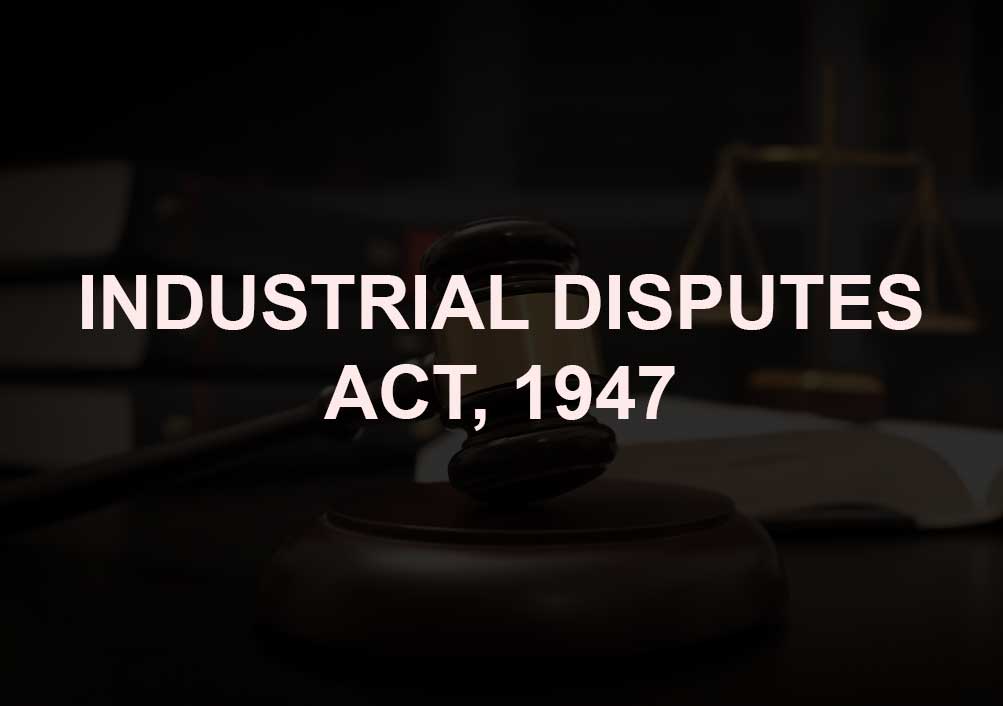In WRIT PETITION NO.8568 OF 2013 (L-TER)-KAR HC- Labour Court cannot interfere with order of punishment for violation of Se.33(2)(b) of Industrial Disputes Act when dismissal is justified: Karnataka HC Justice Jyoti Mulimani [12-05-2022]

Read Judgment: KARNATAKA STATE MEDICAL AND SALES v. ASTRAZENECA PHARMA INDIA LTD
Mansimran Kaur
Bangalore, May 28, 2022: The Karnataka High Court has observed that the Labour Court is not precluded from deciding the dispute on merits even if there is violation of Section 33(2)(b) of Industrial Disputes Act, 1947 and when the dismissal is justified, the Labour Court cannot interfere with the order of punishment just for violation of Section 33(2)(b).
A Single Bench of Justice Jyoti Mulmani opined that once the employee accepts the term and conditions of the Appointment Order and also the other prevailing service conditions, he is estopped from claiming better benefits.
The facts of this case weresuch that the second petitioner was working as a medical representative at Bangalore under the respondent-company. After the intervention of the union FMRAI, the petitioner was transferred to Bangalore. Since, he could not afford an independent accommodation, the second petitioner was staying at the guest house of the first petitioner in Bangalore. It was stated that the same was not tolerated by the respondent- company and it started harassing the second petitioner. When a charge sheet was issued, the second respondent was called for inquiry.
It was the case on behalf of the petitioner that he was not given any opportunity to defend himself and the inquiry was completed in one day with all the members being from the respondent- company. Consequently, the respondent-company terminated the services of the second petitioner. In pursuance of the same, the second petitioner filed an application. The Labour Court, however, rejected the petition. Under these circumstances, the petitioner filed the present writ petition under Articles 226 and 227 of the Constitution of India.
The Court observed that the respondent- company called into question the low performance of the second petitioner several times through letters, however, his performance did not improve which compelled the respondent- company to take disciplinary actions against him. The Court further noted that against the disciplinary enquiry the petitioner was given a chance to represent his case. His case was though found unsatisfactory and therefore his services were eventually terminated with effect from August 10, 2007.
Further with respect to the challenge made to order of the Labour Court, the Court analysed Section 10 (4A) of the I.D. Act and held that the amended section gives the liberty to the individual workman who has been discharged, dismissed, retrenched or terminated to directly approach the Labour Court for adjudication of such an application in the same manner as a dispute referred for adjudication under section 10(1)(c) of the I.D Act. Thus, the Labour Court had to dispose of the application under Section 10(4-A) of the Act in the same manner as a dispute referred to by the Government for adjudication, the Court noted.
It was further observed that it is a settled proposition of law that the jurisdiction of the Labour Court Industrial Tribunal in Industrial disputes is limited to the points specifically referred for its adjudication and matters incidental thereto and it is not permissible to go beyond the terms of the reference. An Industrial Adjudicator constituted under the Act is not vested with any inherent power or jurisdiction. With respect to the same, the Court opined that the Industrial Adjudicator rightly adjudicated the dispute between the parties and in extenso referred to the material on record and passed the award. So, there was substantial compliance of section 10 (4A) of the I.D. Act.
Next, with respect to the contention of the petitioner that several industrial disputes were lying pending at the time of termination notice being granted to him, hence the respondent- company ought to have filed an application under Section 33 (2) (b) of the I.D. Act, the Court observed that if there was violation of this Section it should have been specifically pleaded and brought in evidence. Further reliance was placed on the judgments of the Apex Court in Rajasthan State Transport Corporation, Management of Karur Vyasa Bank and Managing Director, NEKRTC Karnataka.
Further with respect to Article 14 of the Indian Constitution, the Court noted that the allegation of decimation and equality is not available to the workman in the matter of disciplinary proceedings. The concept of equality enshrined under Article 14 of the Constitution of India cannot be enforced in a negative manner, the Court remarked. Thus in light of the above observations, the Court dismissed the writ petition.
Sign up for our weekly newsletter to stay up to date on our product, events featured blog, special offer and all of the exciting things that take place here at Legitquest.




Add a Comment